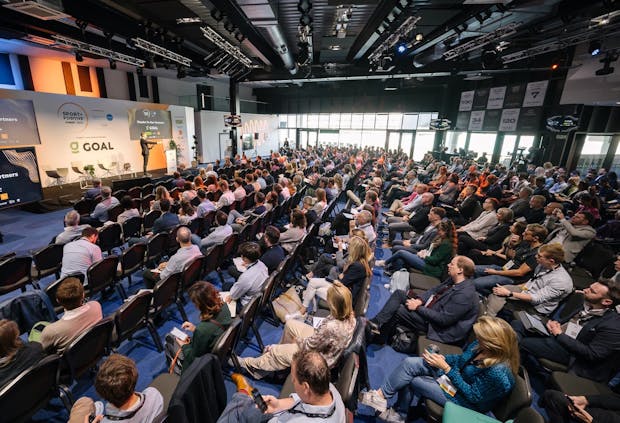
Industry leaders will come together for the Sport Positive Summit, at the Kia Oval in London and online, over October 8-9, to create one of the largest gatherings of global sports stakeholders aiming to advance sustainability, biodiversity, environmental justice and tackle the climate crisis.
We spoke to Claire Poole, founder and chief executive officer of Sport Positive, to learn more about a key theme of the event – how sports organisations can leverage sustainability not just in terms of CSR, but as a revenue generator too.
During the Sport Positive Summit on October 8 and 9, what topics will the discussions and panels cover, and how will they assist sports organisations in leveraging sustainability not just in terms of CSR, but as a revenue generator too?

Sport is being regularly affected now by the impacts of climate change. Schedules are being changed due to extreme heat and risks of athletes training and competing in it, bushfire smoke affecting outdoor and even indoor sports, flooding is impacting grassroots sport (which will impact the talent pool in the medium to long term) and extreme weather events impacting competitions are increasing.
Sport business cannot ignore these changes, even in the short term, changing risks mean changes for insurance, potential impacts on scheduling both for fans/ticketing and broadcast schedules as well as commercial deals. Corporate disclosure regulations are changing too, with CSRD and CSDDD in Europe, SEC climate disclosures in the US and similar regulations in other parts of the world. Sport will only be more and more impacted by these going forward and are well advised to get ahead of them. Board members not taking climate risks seriously are potentially in breach of their fiduciary duty.
The commercial side of sport is shifting too, we can see sports organisations that lead on sustainability are highly attractive to brands looking for sport sponsorship that reflect their values, have data ready to share for their own corporate sustainability disclosure and have a fan base that is engaged around these issues. There are now increasing reputational risks to inaction.
Playing a role in tackling the climate crisis and embedding sustainability into your organisation’s DNA is not altruism, it’s good business and it’s working to ensure a long-term future social licence to operate. With all of this in mind, Sport Positive Summit 2024’s ’The Business of Sustainable Sport’ and ‘Governance and Reporting’ streams are highly relevant for SportBusiness readers. Attendees can come to hear from those leading the way across commercial, governance and regulatory shifts, to ensure they are informed and have the tools at their disposal to lead from the front.
What are the primary obstacles sports organisations face in adopting more sustainable practices?
When we speak to global sports organisations of all sizes, the reported internal challenges are almost always: expertise – not having sufficient expertise internally to know what credible actions to take and how; and resource – both human and financial – to bring in additional staff or technology to adopt and roll out more sustainable practices.
Another obstacle can be very long-term commercial deals that preclude an organisation looking at other partners that might support with enhanced sustainability efforts. External obstacles also exist around infrastructure. If a venue isn’t served by public transport or is in a part of the world where waste sorting/recycling isn’t the norm, it is a much longer road to get elements in place to reduce impacts from travel or waste.
Some of these challenges are fairly simply overcome by an understanding of the long-term benefits, shifting the way things are done and financial resources are allocated. Others require systemic change, and will take longer, but sport is a huge influencer that can play a role in overcoming these obstacles, if inclined to do so.
Sports organisations of all types, sizes, with varying resources and in all geographies, are taking action to adopt more sustainable practices, so the right mindset and desire of decision-makers seems to overcome many hurdles.

Where do you believe to be the key revenue-generating benefits for sports teams, leagues, hosts and venues that implement eco-friendly and energy-efficient practices?
Depending on the type of organisation you represent, there are often long-term savings to be made by moving to eco-friendly practices. The Russian invasion of Ukraine two years ago sent shockwaves through the energy landscape, and led to some larger venues in Europe experiencing energy bills increase by millions of pounds. This volatility led to an uptick of interest in on-site and renewable energy.
For venues, investments such as on-site renewable energy, water irrigation and LED lights, require initial capital investment, but lead to longer-term savings, reduction in need for resources and higher levels of certainty. Operational cost savings is one financial facet of eco-friendly practices.
However, we are now seeing a shift on the commercials of sports sponsorship in a couple of different ways. Organisations that are holistically and consistently leading on sustainability are bringing in new sponsors and creating new categories. Partnerships with eco-friendly organisations and innovations are also increasing.
What opportunities can leveraging sustainability provide for emerging and niche sports organisations looking to stand out in a sports landscape saturated with ‘big names’?
You only have to look at examples like Forest Green Rovers FC to see that smaller sports organisations can have huge commercial benefits when they lead on sustainability and carve out leadership in this area. In 2022 FGR reported that partnership revenue grew five times in the previous three years – “despite putting purpose before profit in just about every organisational decision it makes”.
Can you provide examples of sports teams, organisations or events that have successfully monetised their sustainability efforts?
A few examples of organisations that have spoken out about connecting purpose or sustainability with commercial aspects (rather than ‘monetising’ sustainability efforts such as this question poses) include FGR as mentioned, Manchester City and Xylem (with a focus on water), IMOCA and 11th Hour Racing (to create new standards in sailing and encourage diversity).
At the Summit this year we’ll hear from the likes of Liverpool FC, Mastercard, WM, Cleveland Cavaliers and more, who will talk to how they have generated new revenue through their leadership on sustainability, or what appeals to working with sports organisations that have taken the lead in this area.
What emerging trends in sustainability are likely to shape the commercial landscape of the sports industry in the future?
Climate disclosure is probably the biggest landscape shift. Major corporate businesses must disclose their own impact and within their supply chain; if they sponsor a sports organisation or event, that will be in their purview through their supply chain. Publicly traded or larger sports organisations will also fall within mandatory reporting in certain parts of the world. This will influence the commercial landscape both now and in the future, as mandatory disclosure is only going one way and will evolve to affect more and more organisations.
The rise of disclosure on nature and combatting biodiversity loss is a major issue, and it will impact the commercial landscape of partners and activities in the future through reputational risk of aligning with sponsors or brands that are responsible for biodiversity loss or as major polluters.
Tech-driven sustainability is on the rise through AI and machine learning. Sport is already deploying AI and machine learning, with more and more opportunities to connect this with sustainability. It must be managed carefully, but opportunities are present.

Lastly, if you had to pick one part of the Sport Positive Summit that you are most looking forward to, what would it be and why?
Oh come on, that would be like picking your favourite child! What I would say is that this year there really is something for everyone, whether you are further along on your sustainability journey or just getting started, whether you are commercially focused, operational, in the legal or HR team there is content across two days for you. It’s not all panels either, you can hear user cases from amazing organisations but then there is time for deep diving into key opportunities and challenges too. Our global attendees and community will be there to help your understanding, move things forward, uncover exciting partnerships and network. Our ‘Business of Sustainable Sport’ and ‘Governance, Targets and Reporting’ two-day streams are probably the most interesting for readers of SportBusiness, but we also have keynote debates, peer-to-peer roundtables and content streams on Impact Reduction, Community, Biodiversity and Comms/Behaviour Change.